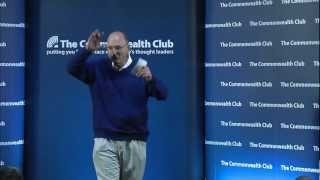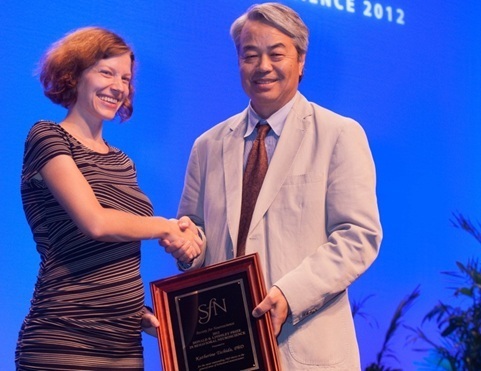Marty Nemko's Blog, page 434
July 9, 2013
Helping a Loved One With Their Career

Often our spouse, adult child, or even parent struggle to find good work. How can our efforts help rather than annoy them?
That's the topic of this week's column by Michael Bernick, former head of California's Employment Development Department. HERE's the link.
I'm pleased that he interviewed me for that column although his calling me "the dean of California's job coaches" reminds me how old I am. Usually people are described as "the dean" when they have one foot in the grave. It's a little like those lifetime achievement Oscars. The subtext is, "Your life's over, dude."
Published on July 09, 2013 09:11
July 8, 2013
Are You an Ethical Employee?

Many people think they're more ethical than they in fact are. My USNews.com article today: Are You an Ethical Employee?
Published on July 08, 2013 08:47
July 1, 2013
Lessons from My Successes
This video, Lessons from My Successes, is the companion to the just-posted video, Marty Nemko: Man of 1,000 Failures, which offers career and life lessons from my failures.
Published on July 01, 2013 12:31
Lessons from My Failures
I turned 63 yesterday and reflected on my life. I've had my successes but also plenty of failures.
People like to talk about their successes but failures may be as instructive, so I created this video, Lessons from My Failures
To balance things out, my next video will offer lessons that might be learned from my successes.
People like to talk about their successes but failures may be as instructive, so I created this video, Lessons from My Failures
To balance things out, my next video will offer lessons that might be learned from my successes.
Published on July 01, 2013 12:01
Marty Nemko: Man of 1,000 Failures
I turned 63 yesterday and reflected on my life. I've had my successes but also a lot of failures.
People like to talk about their successes but I believe their failures may be more instructive, so I created this video, Marty Nemko: Man of 1,000 Failures.
To balance things out, my next video will offer lessons that might be learned from my successes.
People like to talk about their successes but I believe their failures may be more instructive, so I created this video, Marty Nemko: Man of 1,000 Failures.
To balance things out, my next video will offer lessons that might be learned from my successes.
Published on July 01, 2013 12:01
Hiring Wisely: The Art of Selection
Published on July 01, 2013 08:58
June 25, 2013
What Every Career-Minded Person Must Know And Probably Doesn't

On July 18, I give a low-cost presentation, What Every Career-Minded Person Must Know And Probably Doesn't. Sponsored by the San Francisco Professional Career Network, I'll discuss:
-- Under-the-radar careers
-- Low-risk/high-payoff self-employment opportunities
-- Ahead-of-the-pack strategies for job seekers
-- True keys to getting ahead
-- Thoughts on the life well-led
For more information and tickets, click. HERE.
Published on June 25, 2013 00:03
June 24, 2013
The Gentle Art of Salary Negotiation

When you read the word, "negotiation," what word pops into your mind?
Perhaps "argument," "tough" or some such. But it's probably not
"gentle." Nevertheless, it may be wise to negotiate gently. How to do that is the topic of my USNews.com article today.
Published on June 24, 2013 10:49
June 22, 2013
Establishing a Prize: A Potent Approach to Philanthropy

Here's an advance look at my next The Life Well-Led column in the Mensa publication, The Intelligencer.
I haven't submitted it yet, so your feedback is particularly welcome.
The Life Well-Led
by Marty Nemko
A Bang-for-the-Buck Approach to Charitable Giving
My previous charitable donations haven't yielded sufficient benefit.
For example, I funded the development of an online course for teachers of gifted kids. It was garbage.
Before wasting more money, I've done some thinking and
research on how to get the most bang from my charity bucks. Perhaps the
results of my exploration and the unusual charitable scheme I then concocted might help you in making wise donations.
The building blocks
1. Perhaps not surprising, as a Mensan, I value
intelligence. So I'd like to invest my money in intelligent people who are
working on improving intelligence. While, of course, brainpower can be used
for good or ill, improving humankind's intelligence is a potent approach to enhancing
civilization.
2. Funding a prize for the best research on improving intelligence would encourage many people to work toward that goal.
3. Restricting the prize to people at the end of doctoral
training seems optimal: It's late enough
in the person's career for the selection committee to be able to validly assess nominees' potential but early enough to
greatly affect how influential s/he is likely to be, for example, whether s/he gets a
post at Harvard or at a less prestigious institution.
4. The prize should be administered by a prestigious
organization. That adds prestige to the prize, which in turn means the prize's size can be smaller, which could enable me to fund more than one prize.
5. The organization must have a mechanism for broadly soliciting nominees for the prize, and be willing and able to assemble a strong committee to
review the proposals. Alternatively, the committee could, instead of soliciting and reviewing proposals, pick the winner by reviewing the abstracts of presentations by doctoral students or recent graduates at major conferences.
What have I done?
With those as guiding principles, here is what I have done:
I have just established The Nemko Prize For the Study of the Biology of Cognition. I
would have preferred a narrower focus: the biology of intelligence
but the best organization to administer the prize, the Society for Neuroscience (SfN,) wanted the broader scope. SfN is otherwise ideal: It is the world's largest and
most prestigious organization focusing on brain research, consisting of 42,000
researchers, including most of the field's luminaries. Also, SfN already
administers a number of other prizes and has a proven mechanism for soliciting
and reviewing nominees. (The photo above is of a woman receiving an SfN-administered prize.)
The winner of the Nemko Prize will receive $2,500 but SfN is charging me $7,500.
I'm okay with that because that includes the costs of soliciting and reviewing nominations and of travel for the winner to attend SfN's annual meeting, invaluable for a young
researcher.
So, for $7,500, the world's neuroscience doctoral students will be incented to do their dissertation on the crucial biological basis of cognition and the best of those students will get a significant career boost.
Relative to most other $7,500 donations, I believe that has greater potential to do good. Who knows? Maybe it will even result in more candidates for Mensa!
My plan is to endow the prize as a perpetuity but SfN is allowing me to try it out for three years.
I believe it's often wiser to donate to such a charitable venture
than to give the money to family members. Too often, the family member doesn't
really need the money and/or the largesse encourages them to sit on their butts--the so-called welfare
mentality. I've seen many adult children of wealth, so-called trust fund
babies, be rendered unproductive because their parents gave them
"welfare." Thus, charitable giving can be key not only to your life
being well-led but to your family's.
Published on June 22, 2013 17:37
A Powerful Approach to Philanthropy: Establish an Annual Prize

I've been thinking about how to give charity wisely. Perhaps my decision can help inform your philanthropic plans.
I've decided to create and fund an annual prize: The Nemko Prize in Molecular and Cellular Neuroscience . Each year, there will be a competition for the best young scientist studying the cellular and molecular (including genetic) bases of brain function. Of course, brainpower can be used for good and for ill but optimizing our ability to think is, net, a high-potential approach to improving humankind.
I chose a prize for young scientists as a bang-for-the-buck vehicle for my donation because the prize's existence may encourage a number of brilliant people to pursue research in this vital area and the winner's career will be abetted at the stage when such a prize can make the difference between getting a prestigious research position or not.
Even though the Society for Neuroscience is charging me much more than the amount of the Nemko Prize to administer it, I've decided that is a wise investment because The Society for Neuroscience is the world's largest and most prestigious organization of researchers studying the brain. It has 42,000 members. It will solicit nominations for the prize to a very wide yet ideally targeted audience and will have a committee of luminaries to review the nominations.
I'm excited that at the Society for Neuroscience's annual meeting, I will both be giving the award to the winner as well as presenting a 2 1/2-hour workshop on career and life management for researchers.
Published on June 22, 2013 00:44
Marty Nemko's Blog
- Marty Nemko's profile
- 4 followers
Marty Nemko isn't a Goodreads Author
(yet),
but they
do have a blog,
so here are some recent posts imported from
their feed.




